
Gaborone is the capital and largest city of Botswana with a population of 246,325 based on the 2022 census, about 10% of the total population of Botswana. Its agglomeration is home to 421,907 inhabitants at the 2011 census.
An environmental tax, ecotax, or green tax is a tax levied on activities which are considered to be harmful to the environment and is intended to promote environmentally friendly activities via economic incentives. A notable example is carbon tax. Such a policy can complement or avert the need for regulatory approaches. Often, an ecotax policy proposal may attempt to maintain overall tax revenue by proportionately reducing other taxes ; such proposals are known as a green tax shift towards ecological taxation. Ecotaxes address the failure of free markets to consider environmental impacts.

Waste management or waste disposal includes the processes and actions required to manage waste from its inception to its final disposal. This includes the collection, transport, treatment and disposal of waste, together with monitoring and regulation of the waste management process and waste-related laws, technologies, economic mechanisms.
Sustainable living describes a lifestyle that attempts to reduce the use of Earth's natural resources by an individual or society. Its practitioners often attempt to reduce their ecological footprint by altering their home designs and methods of transportation, energy consumption and diet. Its proponents aim to conduct their lives in ways that are consistent with sustainability, naturally balanced, and respectful of humanity's symbiotic relationship with the Earth's natural ecology. The practice and general philosophy of ecological living closely follows the overall principles of sustainable development.

Zero waste is a set of principles focused on waste prevention that encourages redesigning resource life cycles so that all products are repurposed and/or reused. The goal of the movement is to avoid sending trash to landfills, incinerators, oceans, or any other part of the environment. Currently 9% of global plastic is recycled. In a zero waste system, all materials are reused until the optimum level of consumption is reached.

Green building refers to both a structure and the application of processes that are environmentally responsible and resource-efficient throughout a building's life-cycle: from planning to design, construction, operation, maintenance, renovation, and demolition. This requires close cooperation of the contractor, the architects, the engineers, and the client at all project stages. The Green Building practice expands and complements the classical building design concerns of economy, utility, durability, and comfort. Green building also refers to saving resources to the maximum extent, including energy saving, land saving, water saving, material saving, etc., during the whole life cycle of the building, protecting the environment and reducing pollution, providing people with healthy, comfortable and efficient use of space, and being in harmony with nature Buildings that live in harmony. Green building technology focuses on low consumption, high efficiency, economy, environmental protection, integration and optimization.’
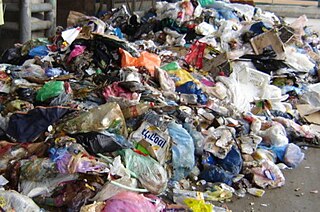
Municipal solid waste (MSW), commonly known as trash or garbage in the United States and rubbish in Britain, is a waste type consisting of everyday items that are discarded by the public. "Garbage" can also refer specifically to food waste, as in a garbage disposal; the two are sometimes collected separately. In the European Union, the semantic definition is 'mixed municipal waste,' given waste code 20 03 01 in the European Waste Catalog. Although the waste may originate from a number of sources that has nothing to do with a municipality, the traditional role of municipalities in collecting and managing these kinds of waste have produced the particular etymology 'municipal.'
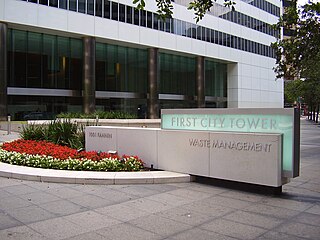
Waste Management, Inc., doing business as WM, is a waste management, comprehensive waste, and environmental services company operating in North America. Founded in 1968, the company is headquartered in the Bank of America Tower in Houston, Texas.
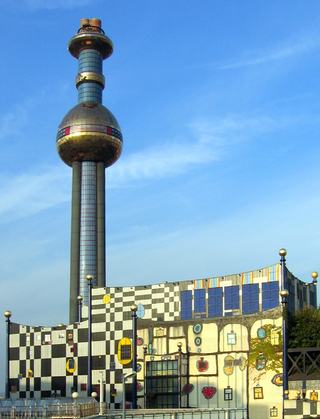
Waste-to-energy (WtE) or energy-from-waste (EfW) is the process of generating energy in the form of electricity and/or heat from the primary treatment of waste, or the processing of waste into a fuel source. WtE is a form of energy recovery. Most WtE processes generate electricity and/or heat directly through combustion, or produce a combustible fuel commodity, such as methane, methanol, ethanol or synthetic fuels.

A green-collar worker is a worker who is employed in an environmental sector of the economy. Environmental green-collar workers satisfy the demand for green development. Generally, they implement environmentally conscious design, policy, and technology to improve conservation and sustainability. Formal environmental regulations as well as informal social expectations are pushing many firms to seek professionals with expertise with environmental, energy efficiency, and clean renewable energy issues. They often seek to make their output more sustainable, and thus more favorable to public opinion, governmental regulation, and the Earth's ecology.

Sustainable packaging is the development and use of packaging which results in improved sustainability. This involves increased use of life cycle inventory (LCI) and life cycle assessment (LCA) to help guide the use of packaging which reduces the environmental impact and ecological footprint. It includes a look at the whole of the supply chain: from basic function, to marketing, and then through to end of life (LCA) and rebirth. Additionally, an eco-cost to value ratio can be useful The goals are to improve the long term viability and quality of life for humans and the longevity of natural ecosystems. Sustainable packaging must meet the functional and economic needs of the present without compromising the ability of future generations to meet their own needs. Sustainability is not necessarily an end state but is a continuing process of improvement.

Waste are unwanted or unusable materials. Waste is any substance discarded after primary use, or is worthless, defective and of no use. A by-product, by contrast is a joint product of relatively minor economic value. A waste product may become a by-product, joint product or resource through an invention that raises a waste product's value above zero.

The Tibetan Settlement Office (T.S.O.) Tibetan: ང་ཚོའི་སྐོར།, Wylie: nga tsho'i skor is acting within the Tibetan Ministry of the Interior and is part of the central Tibetan administration in Dharmshala, India. The T.S.O. organizes projects in the social, cultural and economical sectors. Furthermore, they focus on issues of environment and enduring development.

Electronic waste is a significant part of today's global, post-consumer waste stream. Efforts are being made to recycle and reduce this waste.
Environmentally sustainable design is the philosophy of designing physical objects, the built environment, and services to comply with the principles of ecological sustainability and also aimed at improving the health and comfortability of occupants in a building. Sustainable design seeks to reduce negative impacts on the environment, the health and well-being of building occupants, thereby improving building performance. The basic objectives of sustainability are to reduce the consumption of non-renewable resources, minimize waste, and create healthy, productive environments.
Recycling can be carried out on various raw materials. Recycling is an important part of creating more sustainable economies, reducing the cost and environmental impact of raw materials. Not all materials are easily recycled, and processing recyclable into the correct waste stream requires considerable energy. Some particular manufactured goods are not easily separated, unless specially process therefore have unique product-based recycling processes.
Xtreme Zero Waste is a non-profit organization dedicated to recycling and based in the town of Raglan, New Zealand. In 2014 it was rebranded from Xtreme Waste. According to its mission statement, its goal is to create a waste management system for the Raglan/Whaingaroa community in which none of the trash would be stored in landfills.
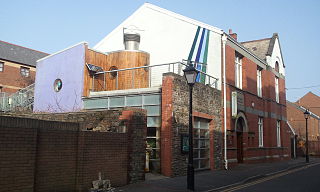
The Environment Centre in Swansea, Wales, is an independent charity organisation for environmental information, education and activity. Environment Centre may also refer to the building the charity is located in.
Resource recovery is using wastes as an input material to create valuable products as new outputs. The aim is to reduce the amount of waste generated, thereby reducing the need for landfill space, and optimising the values created from waste. Resource recovery delays the need to use raw materials in the manufacturing process. Materials found in municipal solid waste, construction and demolition waste, commercial waste and industrial wastes can be used to recover resources for the manufacturing of new materials and products. Plastic, paper, aluminium, glass and metal are examples of where value can be found in waste.
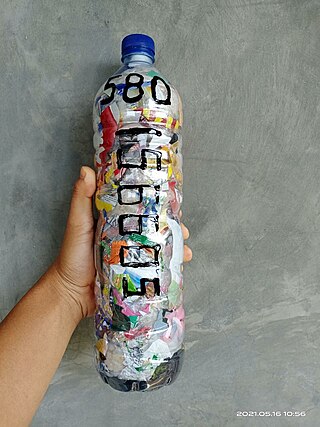
Plastic sequestration is a means of plastic waste management that secures used plastic out of industry and out of the environment into reusable building blocks made by manual compaction. Plastic sequestration is motivated by environmental protection and modeled on the Earth's process of carbon sequestration. Emerging out of the struggle of towns and communities in the Global South to deal with plastic pollution, plastic sequestration compaction methods are characterized by being locally based, non-capital, non-industrial and low-tech. Plastic sequestration is defined by the goals of securing plastic out of the environment and out of high energy/carbon industrial systems. Based on eliminating the chemical and physical and abiotic and biotic degradation pathways, plastic sequestration aims to achieve these goals, by terminally reducing the net surface area of thin film plastics. The building blocks that emerge from plastic sequestration are used in applications that further protect from degradation and permanently keep plastic out of industrial processes, thereby preventing their carbon emissions.


















